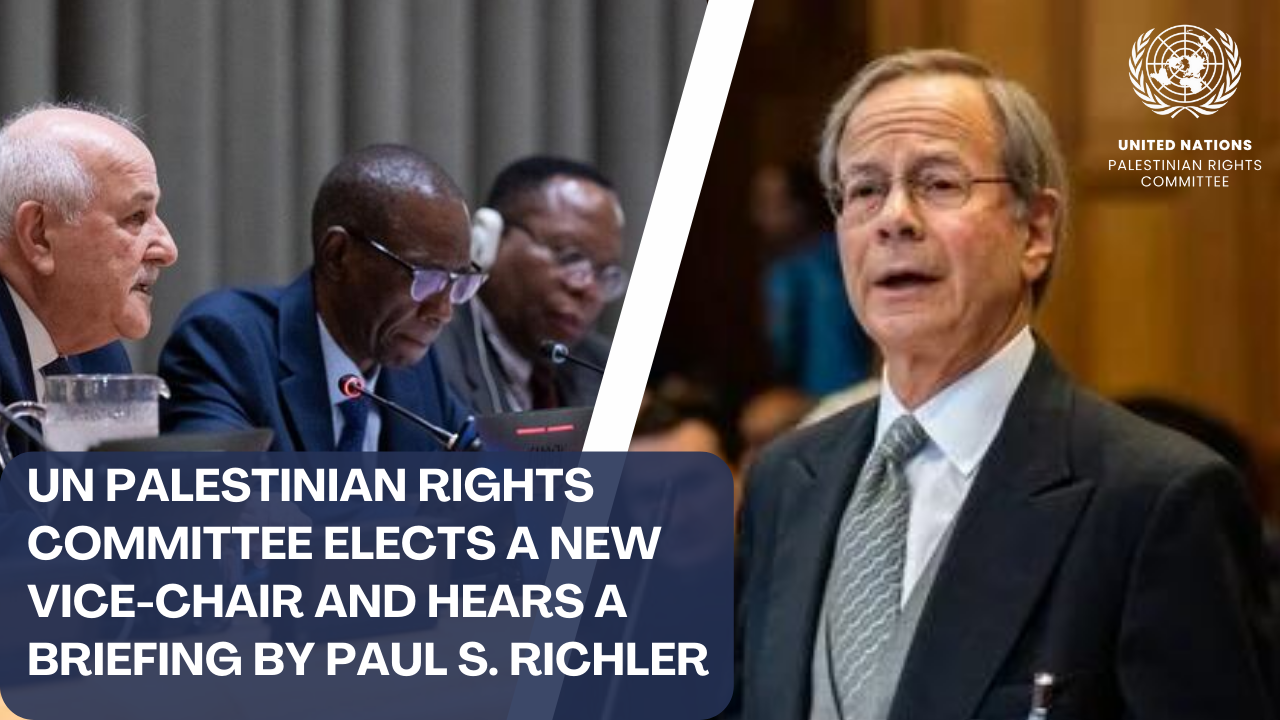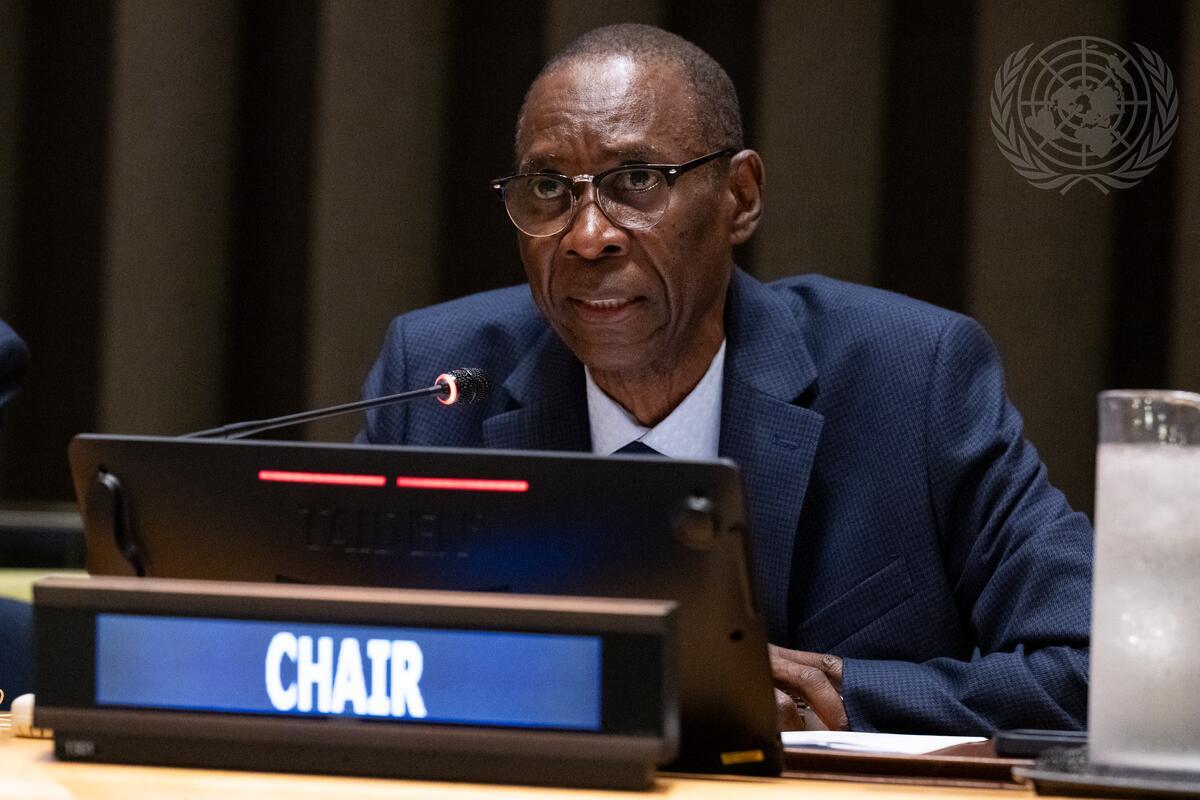
On, 26 June 2024, the UN Committee on the Exercise of the Inalienable Rights of the Palestinian People convened a Committee Meeting in the Trusteeship Chamber at UNHQ in New York. At this meeting, the Committee elected the new Permanent Representative of Cuba, H.E. Mr. Ernesto Soberón Guzmán, as Vice Chair of the Committee. The meeting also heard a briefing by Mr. Paul S. Reichler, a globally recognized figure in public international law.
Riyad H. Mansour, Permanent Observer for the State of Palestine, updating the Committee on the latest developments, highlighted the collective effort of the last nine months in trying to bring an end to the genocidal war against the people of Gaza. “We did not succeed yet in having a permanent ceasefire,” he said; nevertheless, a significant resolution was adopted recently, which begins with a six-week ceasefire and exchange of prisoners, detainees and hostages. This should be the first stage of a permanent ceasefire and should lead to the total withdrawal of Israel from every part of Gaza, he said. That text was adopted by 14 votes in favor in the Security Council with only 1 abstention, so “almost by consensus”, he said, asking for support from all States, especially Council members, to push for its implementation.
Read the press release here.
Also addressing the Committee today was Paul S. Reichler, public international law expert and Counsel to the State of Palestine at the Hague. Stating that there are three critical pending cases related to Palestine, he noted the case brought by South Africa against Israel, as well as the International Criminal Court Prosecutor’s request for arrest warrants against leaders of Israel and Hamas for war crimes and crimes against humanity committed since 7 October 2023. The third pending case is the one in which he is involved, he said, noting that it was initiated in December 2022 by the General Assembly when it sought an advisory opinion from the International Court of Justice concerning the legal consequences arising from the policies and practices of Israel in the Occupied Palestinian Territory, including East Jerusalem.
This case has a much broader scope than the other two in “territory, time and actions,” he pointed out. It concerns not just Gaza, but the entire territory of occupied Palestine, he said, adding that its timeline begins in June 1967. The scope of actions is also broader, covering the entirety of the occupation, from human rights violations to annexation, settlements and the implementation of a system of racial discrimination that sets up two classes of human beings: Israeli Jewish settlers, who enjoy full rights, and Palestinians, who are indigenous to their own land and enjoy no internationally guaranteed human rights. This can only be accurately described as “apartheid” he stressed, noting that both South African Bishop Desmond Tutu and former President Nelson Mandela — whose authority on the question of apartheid cannot be questioned — described the situation thus.
Noting that the case contains two separate questions regarding the legality of the prolonged occupation and the legal consequences arising from that, he said a record number of States participated in written submission and in the oral hearings held in February 2023. While the Court has not yet given a date when its opinion will be issued, it is anticipated in July. Turning to the substance of the case, he said Israel’s occupation is illegal due to its violation of at least three peremptory international norms. First, it is an unlawful acquisition of territory by force in violation of Article 2(4) of the United Nations Charter and customary international law. Secondly, the prolonged occupation has resulted in the denial of the fundamental right of self-determination of the Palestinian people in their own territory. Finally, the systematic racial, ethnic and religious discrimination, tantamount to apartheid, deprives Palestinians of their fundamental human rights, he added.
“The evidence is overwhelming and undisputable, and of the highest probative value,” he said, noting the abundance of reports by the Secretary-General, various UN rapporteurs and fact-finding missions. Scores of Council and Assembly resolutions establish the violations clearly, he said, also pointing to official statements by senior Israeli officials. Reading out some such statements, he described them as “admissions against interest”. Forty-seven States and international organizations, among them Switzerland, France, African Union, Brazil and Japan, made statements supporting Palestine at the oral hearings, he said. Israel chose not to participate in the oral proceedings, and five participating States made adverse statements, but “not a single one” argued that the occupation was lawful. Instead, they argued that the Court should not answer the Assembly’s questions because it would have a negative impact on negotiations between Israel and Palestine. The main exponents of this view were the United States and the United Kingdom, he added. “When other States heard this,” he said, there was a robust rebuttal, starting with: “What negotiations?”
Several States, he said, highlighted Israel’s refusal to negotiate and the current Prime Minister’s emphatic declarations that he will never accept the existence of an independent Palestinian State. They also emphasized that a clarification from the Court on the legal rights and obligations of the parties can only help, not hinder, good-faith negotiations. Also noting a precedent in the case of the United Kingdom’s prolonged occupation of the Chagos Archipelago, he noted the interaction between the Court and the Assembly concerning the decolonization of Mauritius. An Assembly resolution following the Court’s advisory opinion next month could set a date for its implementation, he said. Such a resolution must be taken as soon as possible after the opinion is issued, he said, adding that it could renew the call to admit the State of Palestine as a Member State.
Read the press release here.






